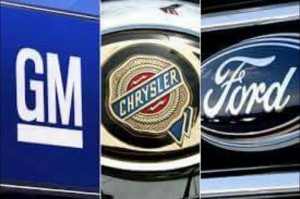
The Big Three. The automakers who installed Wi-Fi in their cars and invented luxurious heated seats. General Motors (GM), Ford Motor Company, and Fiat Chrysler Automobiles (FCA) produce more than ⅔ of all cars sold in the whole world. So, as you can imagine, if these automakers stop producing cars, problems will start to form faster than they can be resolved.
In 2008, two of the Big Three US automakers – General Motors and Fiat Chrysler Automobiles – declared their bankruptcy. To prevent millions of job losses and immense damage to the manufacturing sector, the US and Canadian governments provided $85 million of financial support to GM and FCA in 2009.
“The Big Three are the only American car manufacturers. They employ a large number of people, who in turn, support the economy with their spending power,” says Ahmed Bazzari, a quality engineer at Fiat Chrysler Automobiles. “Allowing the Big Three to fail would have a serious impact on the US economy. The bailout was a ‘crutch’ that allowed FCA and GM to continue to function until they could heal themselves again.”
GM and Chrysler went bankrupt because of low auto sales. According to https://useconomy.about.com/od/criticalssues/a/auto_bailout.htm, “By December 2008, auto sales were 37% lower than a year earlier. This was 400,000 fewer vehicles, or the equivalent of two factories’ annual output. GM and Chrysler had the worst decline, while Ford’s loss was about the same as industry leaders Honda and Toyota.”
Jehad Zughyer, a design release engineer/product engineer who works at GM, states “There are many reasons GM and Chrysler fell into bankruptcy. Legacy costs, victim to their large  size, bad management and tough union contracts.” Zughyer adds, “And most importantly is that the Big Three in general have not been delivering the product that the American consumer is expecting in terms of design and quality. Other competitors such as the Japanese were able to deliver these products, and thus were able to take away from the Big Three market share.”
size, bad management and tough union contracts.” Zughyer adds, “And most importantly is that the Big Three in general have not been delivering the product that the American consumer is expecting in terms of design and quality. Other competitors such as the Japanese were able to deliver these products, and thus were able to take away from the Big Three market share.”
This bailout allowed these two American automakers a second chance to restructure through tough times. The financial aid provided by the US government for General Motors and Fiat Chrysler Automobiles had both a negative and a positive impact on their operating procedures.
Gregory Bourgoin, a supplier quality engineer at GM who formerly worked at FCA elaborates. “A lot of people now think that GM and FCA are weak companies because it took the government to rescue them. Future sales were also negatively impacted.” He adds, “Many people thought that these companies should not survive because of management incompetence and too much capacity.”
However, there were also positive impacts of this bailout as well. “The bailout forced each company to rethink future operating strategies and understand market conditions better.” Bourgoin says. General Motors and Fiat Chrysler Automobiles became better companies after this bailout.
The bailout that took place in 2009 affected GM and FCA negatively and positively. The Big Three would have never existed with the same size and success as they do today if they didn’t experience bankruptcy and mend their errors for future references. All in all, the bailout created better companies than the ones who went bankrupt.
Mariam Odeh
Unis Middle School Journalist
Hi there outstanding website! Does running a blog such as this require a massive amount work? I have no expertise in computer programming but I had been hoping to start my own blog in the near future. Anyways, should you have any suggestions or techniques for new blog owners please share. I know this is off subject nevertheless I just wanted to ask. Appreciate it!|
My district has a webmaster for technical issues. The student editors are responsible for updating information. Itruns rather smoothly for us.
For instance, major music stores like iTunes are not available in Asia and US TV networks which let viewers see programmes on their website don’t make such programmes available to viewers outside the US. This is even if people are willing to pay to download or see the content.. Isn’t an online store or channel where content is legitimately distributed globally possible?. If the government is responsible for restricting distribution, which government are we talking about? The government in the country where the content is produced or the government in the country where the content is to be imported to?.